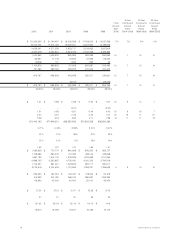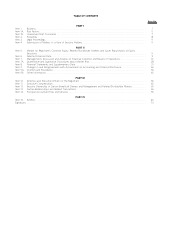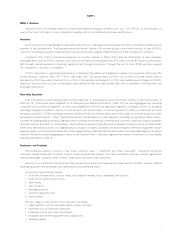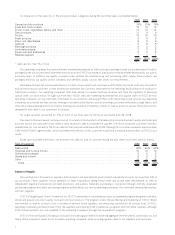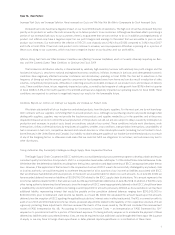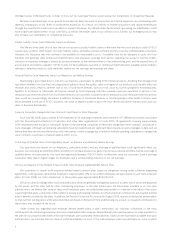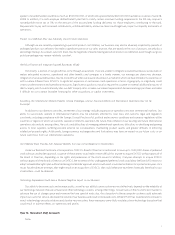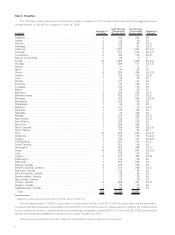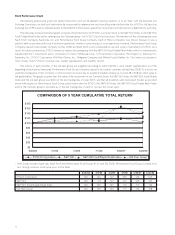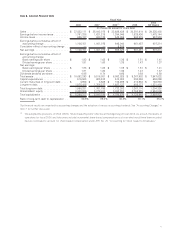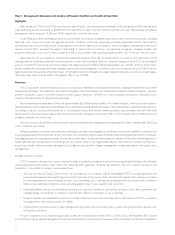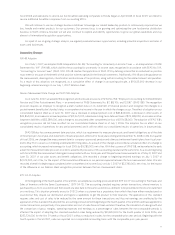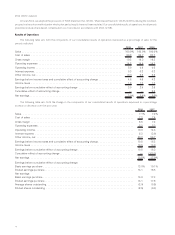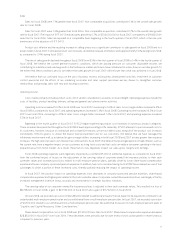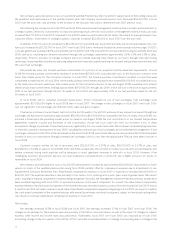Sysco 2008 Annual Report Download - page 30
Download and view the complete annual report
Please find page 30 of the 2008 Sysco annual report below. You can navigate through the pages in the report by either clicking on the pages listed below, or by using the keyword search tool below to find specific information within the annual report.We Need Access to Borrowed Funds in Order to Grow, but Our Leveraged Position Could Increase Our Vulnerability to Competitive Pressures
Because a substantial part of our growth historically has been the result of acquisitions and capital expansion, our continued growth
depends, in large part, on our ability to continue this expansion. As a result, our inability to finance acquisitions and capital expenditures
through borrowed funds could restrict our ability to expand. Moreover, any default under the documents governing our indebtedness could
have a significant adverse effect on our cash flows, as well as the market value of our common stock. Further, our leveraged position may
also increase our vulnerability to competitive pressures.
Product Liability Claims Could Materially Impact our Business
We, like any other seller of food, face the risk of exposure to product liability claims in the event that the use of products sold by SYSCO
causes injury or illness. With respect to product liability claims, we believe we have sufficient primary or excess umbrella liability insurance.
However, this insurance may not continue to be available at a reasonable cost or, if available, may not be adequate to cover all of our
liabilities. We generally seek contractual indemnification and insurance coverage from parties supplying our products, but this indem-
nification or insurance coverage is limited, as a practical matter, to the creditworthiness of the indemnifying party and the insured limits of
any insurance provided by suppliers. If SYSCO does not have adequate insurance or contractual indemnification available, product liability
relating to defective products could materially reduce our net earnings and earnings per share.
Adverse Publicity Could Negatively Impact our Reputation and Reduce Earnings
Maintaining a good reputation is critical to our business, particularly to selling SYSCO Brand products. Anything that damages that
reputation, whether or not justified, including adverse publicity about the quality, safety or integrity of our products, could quickly affect our
revenues and profits. Reports, whether true or not, of food-borne illnesses, such as e-coli, avian flu, bovine spongiform encephalopathy,
hepatitis A, trichinosis or salmonella, and injuries caused by food tampering could also severely injure our reputation. If patrons of our
restaurant customers become ill from food-borne illnesses, our customers could be forced to temporarily close restaurant locations and our
sales would be correspondingly decreased. In addition, instances of food-borne illnesses or food tampering or other health concerns, even
those unrelated to the use of SYSCO products, can result in negative publicity about the food service distribution industry and cause our
sales to decrease dramatically.
Failure to Successfully Renegotiate Union Contracts Could Result in Work Stoppages
As of June 28, 2008, approximately 8,700 employees at 54 operating companies were members of 57 different local unions associated
with the International Brotherhood of Teamsters and other labor organizations. In fiscal 2009, 14 agreements covering approximately
1,900 employees have expired or will expire. Failure of the operating companies to effectively renegotiate these contracts could result in
work stoppages. Although our operating subsidiaries have not experienced any significant labor disputes or work stoppages to date, and we
believe they have satisfactory relationships with their unions, a work stoppage due to failure of multiple operating subsidiaries to renegotiate
union contracts could have a material adverse effect on us.
A Shortage of Qualified Labor Could Negatively Impact our Business and Materially Reduce Earnings
Our operations rely heavily on our employees, particularly drivers, and any shortage of qualified labor could significantly affect our
business. Our recruiting and retention efforts and efforts to increase productivity gains may not be successful and there may be a shortage of
qualified drivers in future periods. Any such shortage would decrease SYSCO’s ability to effectively serve our customers. Such a shortage
would also likely lead to higher wages for employees and a corresponding reduction in our net earnings.
We may be Required to Pay Material Amounts Under Multi-Employer Defined Benefit Pension Plans
We contribute to several multi-employer defined benefit pension plans based on obligations arising under collective bargaining
agreements covering union-represented employees. Approximately 12% of our current employees are participants in such multi-employer
plans. In fiscal 2008, our total contributions to these plans were approximately $35,040,000.
We do not directly manage these multi-employer plans, which are generally managed by boards of trustees, half of whom are appointed
by the unions and the other half by other contributing employers to the plan. Based upon the information available to us from plan
administrators, we believe that some of these multi-employer plans are underfunded due partially to a decline in the value of the assets
supporting these plans, a reduction in the number of actively participating members for whom employer contributions are required, and the
level of benefits provided by the plans. In addition, the Pension Protection Act, enacted in August 2006, requires underfunded pension plans
to improve their funding ratios within prescribed intervals based on the level of their underfunding. As a result, our required contributions to
these plans may increase in the future.
Under current law regarding multi-employer defined benefit plans, a plan’s termination, our voluntary withdrawal, or the mass
withdrawal of all contributing employers from any underfunded multi-employer defined benefit plan would require us to make payments to
the plan for our proportionate share of the multi-employer plan’s unfunded vested liabilities. Based on the information available from plan
administrators, we estimate that our share of withdrawal liability on most of the multi-employer plans we participate in, some of which
6



